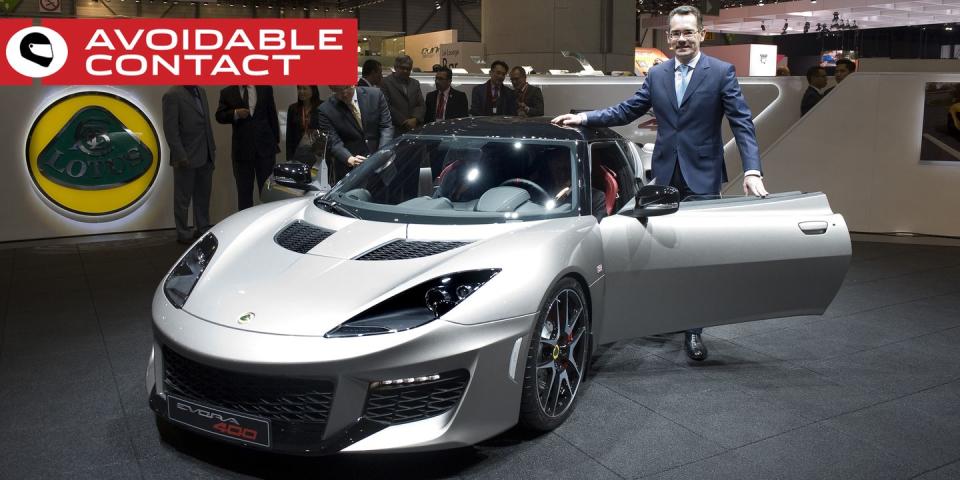Lotus Needs a Leader, And So Does Everybody Else

It started when I ordered a "Baconator" sandwich at Wendy’s in preparation for a long bike ride with my nine-year-old son.
"Why is it called the Baconator?" he asked. The easiest answer would have been,
"Well, it just is." Instead, I gave him a general rundown on the Terminator franchise that ended with the two of us watching the second and third films in the series. Over the course of those four hours or so, he asked approximately two hundred questions about various inconsistencies and hand-waves. "Why can’t the girl Terminator melt away from the magnet, if she’s more advanced than the T-1000?" That kind of stuff. At some point we stopped watching entirely so we could have a discussion about the looping concept of Terminator time. Luckily he didn’t pursue my offhand mention that "time is a flat circle" too far, or we would have had to watch the whole first season of True Detective, which would make me the worst dad in history.
If you think that the self-referential causality of The Terminator and its sequels is a noodle-baker, however, it pales next to the debate over the so-called "Great Man Theory." Thomas Carlyle believed in the power of individuals to shape history, but Herbert Spencer believed that "great men" are the products of their society and that they are produced by conditions rather than being the creator of those conditions. The debate on this has raged for more than two centuries.
It’s the stuff of late-night dorm-room discussions that last until daylight. If Hitler had been killed in the First World War, would another demagogue have replaced him? What about Thomas Edison? In the end, did he simply arrive at his inventions a few weeks or months before someone else would have?

I’d like to respond with a counter-argument that is not original to me: Some are born great, some achieve greatness, and some have greatness thrust upon them. Jean-Marc Gales, who stepped down as the CEO of Lotus yesterday, was probably an example of the second type, if not the third. His career prior to arriving at Lotus had a big win or two (the DS series of Citroens, although invisible to Americans, is hugely important in other markets) but there was nothing to say that he would be the man to succeed where so many others had failed.
Yet succeed he did. Lotus has been in business for 70 years, but until 2017 they’d never turned a profit. Jean-Marc made it happen. This is an achievement roughly on par with hitting .500 for a major league season or bowling 80 strikes in a row. I’m not an accountant and don't have access to Lotus's financials, so I can’t say whether or not all of the books were completely raw and uncooked. But if it were possible to misrepresent Lotus into profitability, it's more likely that would have been done during one of the previous administrations.
More astounding than the mere fact of profitability is the method by which it was accomplished. We’re all familiar with the story of how Porsche dug itself out of its early-'90s doldrums via the Tupperware 996-era cars and the Cayenne. That was a fundamental change in product philosophy, so much so that there is now an entire group of people who obsess over the products made before that change. As an air-cooled 911 owner, I can confirm that I have been asked to participate in this “Loofa Cult” but I don’t know what subtropical sponges have to do with a whole T-shirt industry.
Jean-Marc’s revolution at Lotus, by contrast, didn’t come from abandoning the company’s old philosophy. It came from doubling down on it. The new variants came in Gatling-gun succession–Evora 400 begat Evora 410 Sport begat Evora GT430–and each one sharpened the edge just a little further. The two-seater “small platform” cars were even more extreme.
No idea was too outrageous to be considered. Adjustable traction control? Sure! Four-hundred and thirty horsepower from a Toyota engine in a one-ton clamshell track rat? Why not? Gales let his people run wild, and they rewarded him with a run of cars that will be venerated from now until the moment that the last drop of petroleum is fracked out of a snowy egret’s nesting ground somewhere.
Just as important: Jean-Marc concentrated on what his people could do well and he wasn’t too proud to outsource the things that didn’t require the Lotus touch. In our first conversation, which occurred at GingerMan Raceway a few years ago, he was upfront about the fact that they’d sent the entire engine-management system to a major European supplier for reworking. "We never thought about it again," he said. "We paid the bill and we received a working system."
The Hethel plant in full swing sometimes looked more like a sport-compact tuner shop than an actual factory. Superchargers from Edelbrock in the USA. Boxes upon boxes of brake systems from AP Racing. Carbon fiber parts from Prodrive. Nearly everything came from somewhere else. It wasn’t a cheap way to do business, and the price of the cars reflected that. But the resulting products were reliable and durable in a manner that Lotus had never achieved up to that point.
Gales didn’t do a lot of hiring and firing. He simply freed people to do their best. Then he proceeded to expect that best from them. "A hard man," one of my Lotus contacts said, and he meant it in both the business sense-Gales was demanding-and the English sense. In football, which we call soccer, a "hard man" both motivates his own team and physically defends it against the opposition. By the same token, Gales served as cheerleader and lightning rod all at once. From what I could tell, the men and women at Hethel respected that. "Thank God we have him," was the verdict of one particularly forthright man on the line, a verdict I heard repeated again and again.
It is worthwhile to note that you never saw Jean-Marc Gales showboating around race tracks or courting deliberate controversy. He was approachable and forthright and never indulged in the faux-alpha-male posturing that has blotted the copybooks of so many American auto executives over the past 50 years. He did the job and he showed you how he did it. Lotus is better for having had him at the wheel.

In a world where Jean-Marc didn’t exist, would another CEO have appeared to lead Lotus out of the darkness? That’s like asking if John Connor would exist if he hadn’t sent Kyle Reese back to kick it with his own mother. We can’t know for sure. It didn’t happen that way. The spotlight is now on Feng Qingfeng. He’ll need both luck and skill to continue the Lotus revivial.
Gales, meanwhile, has already taken a position with a restorer of multi-million-dollar classics. I hope he finds plenty of challenges, and plenty of satisfaction, in that new role. But if I held significant stock in any auto company, whether it was Ford or BMW or (gasp!) Tesla, I’d engage in some shareholder activism and demand that Gales be returned to the big leagues, pronto. Go take a look at a 2011 Lotus Evora. Then look at a 2018 Evora GT430. Wouldn’t you like that kind of transformation to be applied to your favorite marque? The "Great Man Theory" might not be proven, but I can’t think of an automaker that wouldn’t benefit from the services of this particularly great man.
You Might Also Like

 Yahoo Autos
Yahoo Autos 